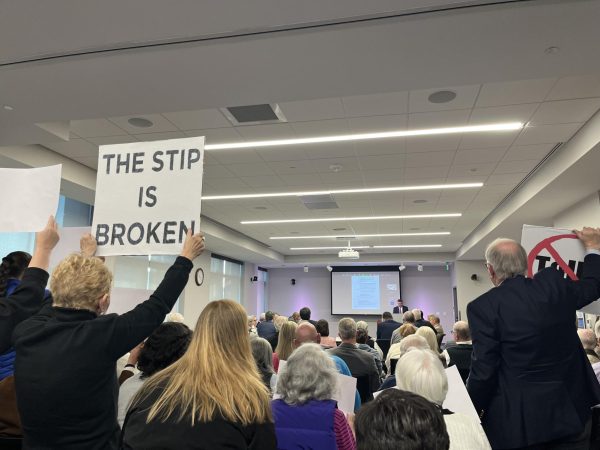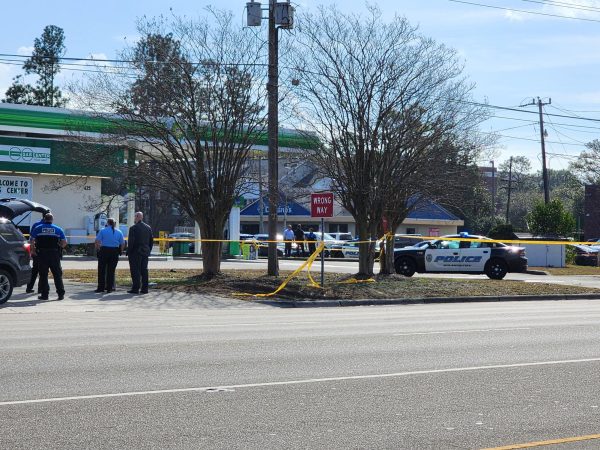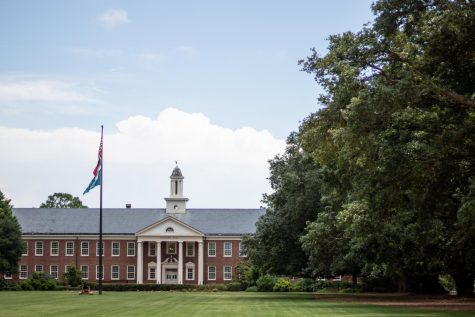The Reality of Trump’s Travel Ban
February 22, 2017
The executive order President Trump signed on Jan. 27, 2017 has some undeniable flaws, not only in purpose and content, but also in the physical execution and implementation of the document. No one knows this better than Hameed Darweesh.
Darweesh has worked for the U.S. Army for 10 years with the Bravo Company 1st Battalion, 187th Infantry Regiment, 101st Airborne Division in Baghdad, Iraq. He also served as an interpreter and an engineer for the U.S. government.
The following is how he describes his job duties in The Washington Post: “I helped Americans protect Iraqis from al-Qaeda terrorists, provide water and electricity, train local police and renovate utilities, roads, bridges, schools, libraries, clinics and hospitals.”
In 2005, Darweesh was involved in a terrorist attack that killed two of his colleagues. The terrorists tracked him for months, putting himself and his family in danger and causing him to move multiple times. Finally, Darweesh decided to move to the United States.
Darweesh told The Washington Post that getting a visa took around three years. He started the process in 2014 and was granted his visa on Jan. 20, 2017, Trump’s inauguration day.
Darweesh and his family left as soon as they could, leaving many of their belongings behind without saying goodbye to their loved ones.
“We arrived at John F. Kennedy International Airport around 5:45 p.m. on Jan. 27 — an hour after the travel ban was signed,” Darweesh told The Post. “When we got off the plane, a U.S. Customs and Border Protection officer escorted me to another office without my family… He held my passport with my U.S. Special Immigrant Visa inside, and he took an envelope I had been given at the embassy in Baghdad with additional documents.”
The officers would not answer any of Darweesh’s questions. They would not tell him why he was there. They would not tell him where his family was or if they were okay. When moving from place to place, he was put in handcuffs. When they did finally answer his questions, the answers were vague and terrifying.
“When I asked about my family,” Darweesh said, “they told me I would meet them there and we would all be deported out of the United States and sent back to Iraq.”
Ultimately, they ended up keeping him in custody for 18 hours without providing food or adequate sleeping conditions.
“I was so confused,” Darweesh said. “I had waited for so long and presented so many documents to the U.S. government over many years to prove my service. After all that, they were going to kick me out? They knew I was repeatedly threatened in Iraq. How could they treat me this way after all I had done?”
Darweesh’s story is a grand example of the glaring flaws in Trump’s executive order. First of all, the countries that are included in the ban, Iran, Iraq, Syria, Libya, Yemen, Sudan, and Somalia, haven’t been responsible for any American deaths in the United States in the past 40 years.
In a study by the CATO Institute, they found that zero foreign-born people from the seven countries listed in the executive order have “committed or were convicted of attempting to commit a terrorist attack on U.S. soil from 1975 through 2015.”
Even though facts and figures seem to be irrelevant to Trump, they are the greatest weapons against him. In an article written by Zack Beauchamp for Vox, Beauchamp gives the following quote with an eye-opening statistic:
“Virtually all the deaths from immigrant attacks (98.6 percent) came from one event: 9/11. Other than that, fatal immigrant-linked terrorist attacks in the U.S. were vanishingly rare. The average likelihood of an American being killed in a terrorist attack in which an immigrant participated in any given year is one in 3.6 million — even including the 9/11 deaths.”
The executive order actually makes the United States a target for radical terrorist groups, like ISIS, because it targets Muslims for no real verifiable reason. David A. Martin, a former Department of Homeland Security lawyer, explains in an article for Vox why the order is detrimental to the safety of the United States.
“The order is a priceless recruiting tool for ISIS and similar movements, because it so easily fits their narrative that the United States is the enemy of all Muslims,” wrote Martin. “Accordingly, the Bush and Obama administrations both strived to avoid all measures that could be painted as broadly anti-Muslim. Much of that vital engagement with Muslim communities has been gravely undone by this order.”
Trump is using this executive order as an attempt to fulfill promises he made to his supporters on the campaign trail. He is advocating for this order, saying that he is not trying to target Muslims specifically and that he just wants to do everything in his power to keep America safe.
With all due respect, Mr. President, this is not the answer.
Being the leader of the free world can not and will not be about meeting the demands of just one group of people. The issues are not black and white, cut and dry problems. There is a human element involved in American politics and detaining someone at the airport for 18 hours who served our country for over a decade on the basis of their religious affiliations or nationality does not align with our beliefs. We will not be persuaded by false claims and fear tactics. We will stand with and for the people this ban unnecessarily attacks. We will not be silenced.
Darweesh was ultimately released from custody, entered the United States and reunited with his family. After everything that he had been through, he told The Post he was not cynical about our country and had hope in the people he met after his release.
“Over the course of those 18 hours, I had grown more and more disappointed,” Darweesh said. “They let me down by treating me as a criminal and putting handcuffs on me. But then, I was welcomed by good people cheering for me and for my release … The people who welcomed me at the airport deserve all I did for their country — they are the true Americans.”
Love and respect is always more beautiful than hate and distrust, and the spirit of those that welcomed Darweesh and his family into America that day at JFK Airport represent the kind of United States we should all strive to create.
Darweesh ends his article in the Washington Post with the following message to the American people:
“America is great because of its people. The American people have shown me that they are friendly, kind and generous. They believe in freedom, in human rights, in respect for other nations … You make up the greatest nation in the world. Thank you for your help and support. May God bless you and your country. And may you stay united.”





















